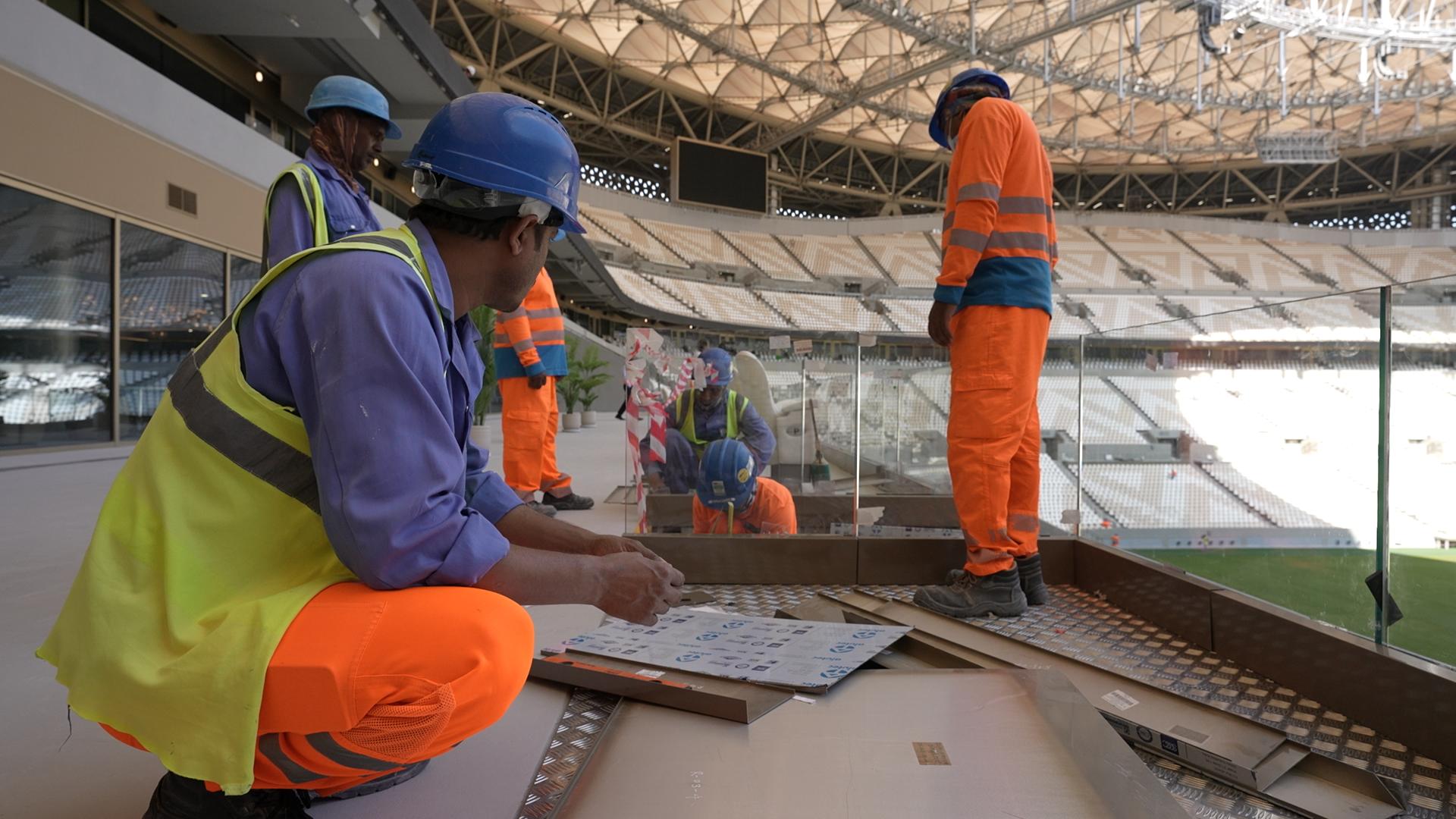An undercover investigation by a German filmmaker has prompted authorities to crack down on a company for failing to pay its workers salaries. A previous investigation by the same journalist revealed disturbing details about the living conditions for many migrant workers.
Qatar’s Ministry Of Administrative Development, Labour and Social Affairs [MADLSA] has taken legal action against a company for violating its workers’ rights following a journalistic investigation.
In his latest investigative piece—filmed in Qatar during the 2021 FIFA Arab Cup—German journalist Benjamin Best revealed that a migrant worker from Nepal working at a Corniche project along with a number of his colleagues did not receive their salaries for four months.
The employees were working for the Gulf House Company for Trading and Contracting in Doha.
“As journalistic work requires, I confronted Ashghal [Qatari Public Works Authority] with these allegations. Qatar’s Ministry of Labour confirmed my findings in a later response,” the journalist told Doha News on Thursday.
In a statement to Best, MADLSA said that its Wage Protection System has alerted the authorities in the past about the delayed payment and responded by fining the company and banning it from the ministry’s services.
Those services include hiring more workers.
“The company will remain on the banned list until all workers have been paid. The Ministry also warned of further action if the issue is not resolved, including permanent blacklisting,” read part of the statement the MADLSA sent the journalist.
Best was previously in Doha in 2019 to film his award-winning documentary entitled “Trapped in Qatar” in which he revealed the poor living conditions of many migrant workers building several stadiums for the FIFA World Cup 2022.
The documentary, aired by German broadcaster WDR, was followed by statements from FIFA President Gianni Infantino, in which he admitted to the presence of violations in workers’ standards.
Best met with employees who lived in accommodations described as unlivable, and heard from them as they complained about how employers withheld their rights including their wages.
“Every day we nourish ourselves on water and bread. Without money we can’t do anything else. Month on month our situation gets worse and worse. I’m not sure how much longer I can do it,” Dil Prasad, a Nepali worker told Best at the time.
As part of the 2019 documentary, families of the workers were also interviewed in their home country, where they complained about the struggles they face due to their husbands’ delayed payments from their company, Tawasol.
The company was a sub-contractor for the Al Bayt Stadium, where the opening game and the final for the Arab Cup took place this year.
FIFA promised at the time to investigate the allegations made by WDR while stressing that the violations were taking place in areas unrelated to stadium construction sites.
“We are aware of reports that the company TAWASOL – a sub-contractor in the construction of the Al Bayt Stadium – has violated the standards for workers,” read a statement, shared by German media in 2019.
The Supreme Committee for Delivery and Legacy [SC], Qatar’s World Cup organising body, also confirmed that 23 Tawasol employees received their outstanding salaries and said they will continue their work.
Qatar to improve data collection on workers’ deaths after Amnesty report
Room for change despite reform
Unlike other former host countries, Qatar has been under the global spotlight, mainly by western media outlets, since it was granted the right to host the region’s first-ever FIFA World Cup more than a decade ago.
Topics of migrant rights, corruption allegations, and anti-LGBTQ laws have been the headlines of most international media coverage of Qatar, despite the Gulf nation implementing vigorous labour reforms.
Reports also addressed loopholes in Qatar’s labour laws that put workers at risk of exploitative practices by their employers.
One such report was released in November by Amnesty International, titled “Reality Check 2021”. The report claimed that “old abusive practices resurfaced” in Qatar despite its wave of labour reforms, which have notably included the dismantling of the controversial kafala sponsorship system.
Authorities in Qatar responded, pointing out that the report failed to mention the progress the Gulf state made, while also noting that they are aware more work still needs to be done.
“Qatar has never shied away from acknowledging that its labour system is still a work in progress. The government is committed to engaging collaboratively and constructively with international partners and critics to further improve standards for all migrant workers in Qatar,” read the statement from the Government Communications Office [GCO].
Among the major reforms Qatar made was the introduction of the region’s first ever non-discriminatory minimum wage, under which employers employers must pay allowances of at least QAR 300 for food and QAR 500 for housing on top of the minimum monthly basic wage of QAR 1,000.
Employers who pay their staff less than the minimum wage face one-year in jail and a QAR 10,000 fine.
Qatar also drastically enhanced monitoring across the board to detect violations, enacting swifter penalties and further strengthening the capacity of labour inspectors.
So far, dozens of companies have faced action from authorities for violating the new laws.
More recently, Qatar’s labour and health ministries signed an agreement aimed at cooperating on data collection to better address work-related injuries and deaths and help improve worksite safety.
This was a response to reports expressing concerns over migrant workers’ deaths and the lack of rigorous data collection on such incidents.
On Wednesday, an official at the workers’ welfare department announced that around QAR 82.35 million had been paid out by contractors to thousands of workers as part of a revolutionary scheme by the SC to combat the illegal practice of charging recruitment fees.
In addition, and as a testament to the Qatar 2022 legacy in action, 11 SC contractors have extended the scheme to cover 18,066 non-SC workers, according to Mohamed Al-Hajri, Compliance and Audit Director of the Workers’ Welfare Department.
________________________________________________
Follow Doha News on Twitter, Instagram, Facebook and Youtube







